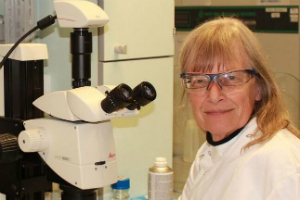University of Reading professor recognised by Royal Society of Chemistry
Release Date 18 May 2016

Professor Christine Cardin from the University of Reading has won the Royal Society of Chemistry's 2016 Rita and John Cornforth Award.
Christine along with colleagues from Trinity College Dublin and University College Dublin were recognised for their structural work on DNA - transition metal complexes, proof of the origins of the "light-switch" effect and its implications for mechanisms of DNA damage.
The Rita and John Cornforth Award enables scientists working in collaborative research teams with both chemistry and the life sciences disciplines to be promoted and rewarded. Christine receives £2,000 in prize money, a medal, and a certificate.
Professor Christine Cardin has been an X-ray crystallographer for many years, with many longstanding collaborations. Recently she has very research active in the area of nucleic acid structure, with a focus on the precise details of small molecule interactions.
An illustrious list of 47 previous winners of the Royal Society of Chemistry's Awards have gone on to win Nobel Prizes for their pioneering work, including Harry Kroto, Fred Sanger and Linus Pauling.
Discussing her award, Christine said: "This has been truly a collaborative effort, and I am only sorry that we couldn't name everyone who has contributed to our success. We are all experts in different techniques, and it is only by combining our skills and understanding that we were able to interpret our data. I would like to thank everyone who has helped us along the way, and we look forward to hearing of the future successes of the many students and postdoctoral fellows who have contributed to our recent work."
Dr Robert Parker, chief executive of the Royal Society of Chemistry said: "It is an honour to recognise the illustrious achievements of our prize and award winners in our 175th anniversary year.
"We were founded in 1841 by a group of academics, industrialists and doctors who understood the power of the chemical sciences to change our world for the better. Our winners share that vision and are advancing excellence in their fields, whether through innovative research or inspirational teaching and outreach.
"We are proud to celebrate and support the work of inspiring and influential individuals, whose work has the potential to improve so many lives."
Award winners are evaluated for the originality and impact of their research, as well as the quality of the results which can be shown in publications, patents, or even software. The awards also recognise the importance of teamwork across the chemical sciences, and the abilities of individuals to develop successful collaborations.
